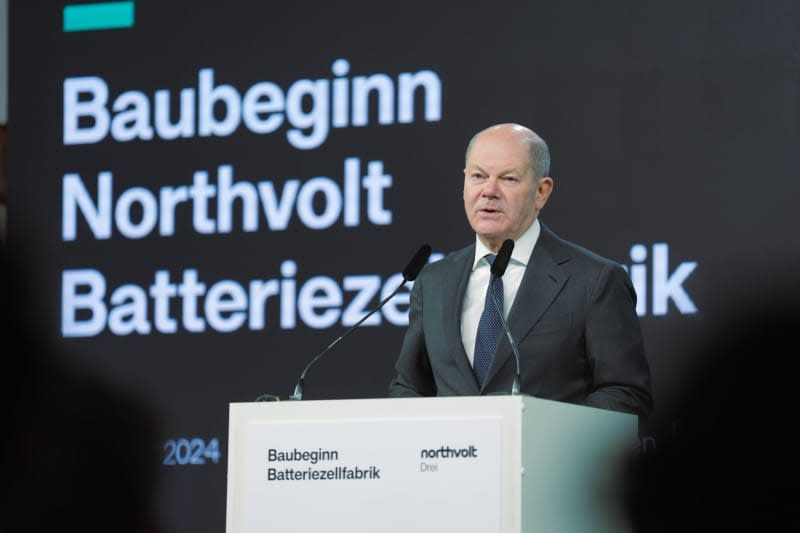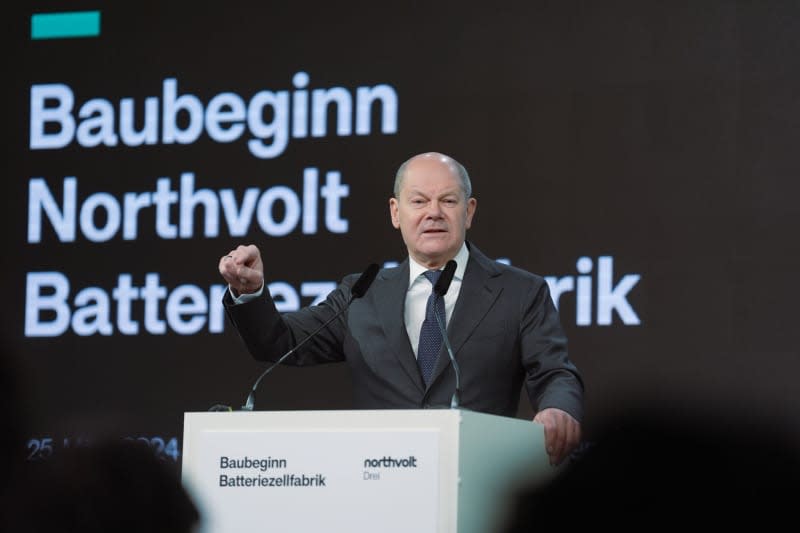Scholz praises strategic importance of new Northvolt battery plant

- Oops!Something went wrong.Please try again later.
- Oops!Something went wrong.Please try again later.
A symbolic start was made in north-western Germany on Monday on constructing a multibillion euro plant making battery cells for electric cars after state funding and local permits were approved.
German Chancellor Olaf Scholz has emphasised the strategic importance of investments such as the Northvolt battery factory for Germany and Europe. "Germany was, is and will remain a strong industrialized country," Scholz said during the gigafactory's opening ceremony.
"And the production of good cars will remain the backbone of our industry beyond the combustion engine." This requires battery cells made in Germany, which is why the construction of the Gigafactory is good news for the whole country, he said.
Swedish company Northvolt plans to invest €4.5 billion ($4.9 billion) in the plant near Heide in the northern state of Schleswig-Holstein. Once completed, the project will produce up to a million battery cells and generate 3,000 jobs. Production is set to start in 2026.
Economy Minister Robert Habeck expects the construction to change a lot on the west coast. "It will look different. It is a major intervention," Habeck said. Conversely, this means that jobs and added value will be created and the region will become more attractive to tourists, the minister added.
State Premier of Schleswig-Holstein, Daniel Günther, spoke of a great day of joy. The construction of the factory will show that investments in renewable energies are worthwhile, he said.
The project is being seen as a pathfinder in the German government's energy and transport transition in a region where wind power is plentiful.
Northvolt plans to mass-produce the "greenest battery in the world." The plant will make use of purified effluent from the region for cooling. Excess heat could be used in a potential district heating grid for Heide, a town of some 22,000 people that lies inland from the North Sea coast to the north of Hamburg.
There are also plans for a recycling facility for old electric car batteries.
"The plant will provide a boost for the whole of Schleswig-Holstein and in particular for the west coast," the state's economy minister, Claus Ruhe Madsen, said.
The aim is for the region to become a hub for the energy transition on the basis of green energy from wind power and research facilities already established there.
Carlsson had indicated earlier that construction could be delayed as a result of comparatively high electricity prices in Germany and large subsidies in the United States.
Talks about setting up the plant have been running since 2021. Subsidies and guarantees for the project were finally approved by the European Commission early this year. The federal and state governments are putting up €700 million and providing guarantees for a further €202 million.
Northvolt puts its order book at $50 billion from customers including Volkswagen Group, BMW, Scania and Volvo Cars. The company has been producing batteries at Skellefteå in Sweden since 2022.


